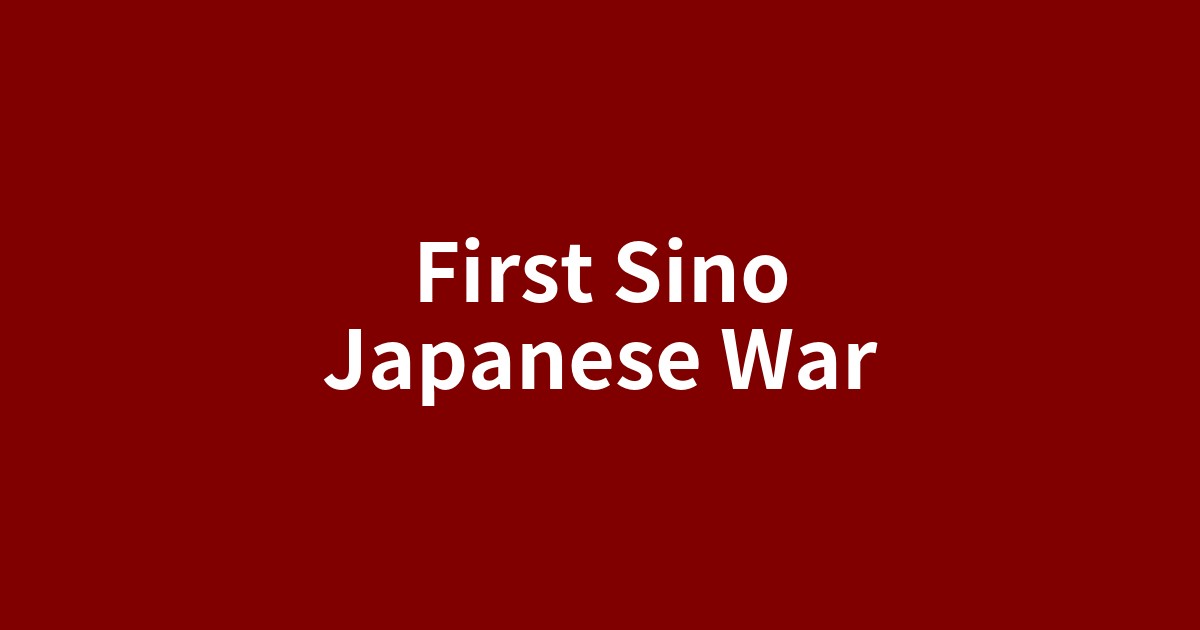このページは、歴史や文化の物語を楽しみながら、その文脈の中で重要な英単語を自然に学ぶための学習コンテンツです。各セクションの下にあるボタンで、いつでも日本語と英語を切り替えることができます。背景知識を日本語で学んだ後、英語の本文を読むことで、より深い理解と語彙力の向上を目指します。

近代化を遂げた日本と、眠れる獅子・清。朝鮮半島をめぐるconflict(対立)が、東アジアの国際秩序をどう塗り替えたか。
この記事で抑えるべきポイント
- ✓日清戦争は、明治維新による近代化を遂げた日本と、伝統的な大国・清との間で、東アジアの覇権(hegemony)をめぐって起こった戦争である点。
- ✓朝鮮半島の支配権をめぐる対立が直接的な原因でしたが、背景には伝統的な中華思想に基づく国際秩序と、近代的な主権国家体制との衝突があったという視点。
- ✓下関条約による日本の勝利は、巨額の賠償金と領土獲得をもたらした一方、ロシア・ドイツ・フランスによる三国干渉を招き、新たな国際的緊張の火種となった点。
- ✓この戦争は東アジアのパワーバランスを根本から覆し、清の衰退を決定づけ、日本が帝国主義国家として大陸へ進出する足がかりになったという、歴史の大きな転換点であったこと。
日清戦争 ― 東アジアの覇権をめぐる戦い
1894年、東アジアで二つの国が衝突しました。一方は明治維新を経て急速な近代化を遂げた日本。もう一方は「眠れる獅子」と称された大国、清。この日清戦争は、なぜ起こったのでしょうか。本記事では、朝鮮半島をめぐる国家間の対立(conflict)が、東アジアの国際秩序をいかに塗り替えたのか、その背景と影響を多角的に紐解いていきます。
The First Sino-Japanese War: A Battle for Hegemony in East Asia
In 1894, two nations clashed in East Asia. One was Japan, which had undergone rapid modernization since the Meiji Restoration. The other was the Qing dynasty, a great power often called the "Sleeping Lion." Why did the First Sino-Japanese War occur? This article will explore from multiple perspectives how the conflict over the Korean Peninsula reshaped the international order of East Asia, delving into its background and consequences.
衝突の火種 ― なぜ朝鮮半島が舞台となったのか?
当時の東アジアには、中国皇帝を頂点とする「冊封体制」という伝統的な国際秩序が存在しました。朝鮮は長らく清を宗主国として仰ぎ、この秩序の中に組み込まれていたのです。しかし、明治維新を成し遂げた日本は、欧米列強に追いつくべく「脱亜」を志向し、朝鮮半島への影響力拡大を試みます。この動きは、壬午軍乱や甲申政変といった朝鮮国内の政変をめぐり、清との緊張を高めていきました。
The Spark of Conflict: Why Korea Became the Stage
At the time, a traditional international order known as the "tributary system," with the Chinese emperor at its apex, existed in East Asia. Korea had long looked to the Qing dynasty as its suzerain state and was incorporated into this order. However, Japan, having achieved the Meiji Restoration, aimed to "escape Asia" to catch up with the Western powers and sought to expand its influence over the Korean Peninsula. This move escalated tensions with the Qing, particularly concerning internal political upheavals in Korea like the Imo Incident and the Gapsin Coup.
「近代」の衝突 ― 日本の勝因と清の敗因
戦いの火蓋が切られると、戦局は日本の優勢で進みました。特に黄海海戦の勝利は決定的で、日本海軍は制海権を掌握します。この勝利は、単に軍艦や兵器の性能差だけではありませんでした。国家としての意思決定の速さ、情報伝達網の整備、兵士の士気といった、国家システム全体の近代化(modernization)の度合いの違いが、勝敗を分けた大きな要因だったのです。この戦争は、欧米列強に「眠れる獅子」と恐れられた清王朝(dynasty)の脆弱性を白日の下に晒し、東アジアの覇権(hegemony)が大きく動くきっかけとなりました。
A Clash of "Modernity": Reasons for Japan's Victory and Qing's Defeat
Once hostilities began, the war progressed in Japan's favor. The victory at the Battle of the Yellow Sea was particularly decisive, giving the Japanese Navy control of the seas. This victory was not merely due to differences in the performance of warships or weaponry. The degree of overall state modernization—including the speed of national decision-making, the development of communication networks, and the morale of soldiers—was a major factor that determined the outcome. The war exposed the vulnerability of the Qing dynasty, once feared by Western powers as the "Sleeping Lion," and became the catalyst for a major shift in the hegemony of East Asia.
戦後の激震 ― 下関条約と三国干渉
日本の勝利で終結した戦争の講和条約(treaty)として、1895年に下関条約が結ばれました。この条約により、清は朝鮮の独立を認め、日本に対して遼東半島、台湾、澎湖諸島を割譲し、さらに巨額の賠償金(compensation)を支払うことになりました。この賠償金は当時の日本の国家予算の4倍以上に相当し、その多くは軍備拡張に充てられ、日本の国力を飛躍的に高めることになります。
Post-War Tremors: The Treaty of Shimonoseki and the Triple Intervention
The war concluded with a Japanese victory, and the Treaty of Shimonoseki was signed in 1895 as the peace treaty. Under this treaty, the Qing recognized the independence of Korea, ceded the Liaodong Peninsula, Taiwan, and the Pescadores Islands to Japan, and agreed to pay a massive compensation. This indemnity was equivalent to more than four times Japan's national budget at the time, and much of it was used for military expansion, dramatically increasing Japan's national power.
結論
日清戦争は、東アジアにおける伝統的な中華秩序が崩壊し、近代的な帝国主義の論理がこの地域を支配する決定的な転換点でした。日本の勝利は、国際的地位の向上という栄光をもたらした一方で、大陸における権益をめぐり、列強との新たな対立の種を蒔くことにもなりました。この19世紀末の歴史の分水嶺が、その後の20世紀、そして現代の国際関係にまでどのような影響を及ぼしているのか。私たちは、その問いと向き合い続ける必要があるのかもしれません。
Conclusion
The First Sino-Japanese War was a definitive turning point, marking the collapse of the traditional Chinese order in East Asia and the rise of modern imperialist logic in the region. Japan's victory brought the glory of an enhanced international status, but it also sowed the seeds of new conflicts with the great powers over interests on the continent. How has this watershed moment at the end of the 19th century continued to influence international relations in the 20th century and even up to the present day? It is a question we may need to continue to confront.
テーマを理解する重要単語
treaty
戦争の終結と、その後の国際関係を規定するのが「条約」です。この記事では、下関条約の内容が日本の国力増強と列強の警戒を招いたと解説されています。条約が歴史を動かす力を持つことを理解する上で必須の単語です。
文脈での用例:
The two nations signed a peace treaty to officially end the war.
両国は戦争を公式に終結させるための平和条約に署名した。
clash
記事の冒頭で、近代化する日本と大国・清という二つの国が「衝突した」と表現されています。単なる「戦い」ではなく、価値観や国家システムそのものがぶつかり合う、激しい対立のニュアンスを伝える言葉として効果的に使われています。
文脈での用例:
The book 'The Clash of Civilizations' sparked a global debate about the future of international relations.
『文明の衝突』という本は、国際関係の未来について世界的な議論を巻き起こしました。
intervention
日本の勝利に待ったをかけたのが、ロシア・ドイツ・フランスによる三国「干渉」です。この出来事は、当時の帝国主義列強の力関係と、日本の大陸進出に対する警戒心を示す象徴的な事件であり、この記事の後半の鍵です。
文脈での用例:
The UN's military intervention was aimed at restoring peace in the region.
国連の軍事介入は、その地域の平和を回復することを目的としていた。
compensation
この記事では、清が日本に支払った巨額の「賠償金」を指します。この賠償金が日本の軍備拡張の原資となり、国力を飛躍させたという流れを理解するために不可欠です。戦争の経済的側面を捉えるためのキーワードです。
文脈での用例:
He received compensation from the airline for his lost luggage.
彼は紛失した荷物に対して、航空会社から補償金を受け取った。
vulnerability
「眠れる獅子」と恐れられた清が、実は多くの「脆弱性」を抱えていたことが日清戦争で明らかになりました。この単語は、大国と見なされていた清の、内実のもろさを浮き彫りにする記事の論調を捉えるのに役立ちます。
文脈での用例:
The system's main vulnerability is its lack of encryption.
そのシステムの主な脆弱性は暗号化が欠けている点だ。
modernization
なぜ日本が清に勝利できたのか?その答えが国家システムの「近代化」の差にありました。軍備だけでなく、意思決定や情報網の近代化が勝敗を分けたという記事の分析を読み解く鍵となる単語です。
文脈での用例:
The modernization of the country's infrastructure was a key government policy.
その国のインフラの近代化は、政府の重要な政策だった。
watershed
記事の結論部分で、日清戦争は19世紀末の歴史の「分水嶺」だったと表現されています。この比喩的な言葉は、この戦争が東アジアの歴史の流れを大きく変える決定的な出来事であったことを示唆しており、筆者の評価を深く理解できます。
文脈での用例:
The invention of the internet was a watershed moment for communication.
インターネットの発明は、コミュニケーションにおける転機となった。
sovereignty
日清の対立の根源には、朝鮮を独立した「主権」国家と見るか否かの認識の相違がありました。この単語は、近代的な国家観と伝統的な冊封体制の衝突という、戦争の根本原因を理解するために極めて重要です。
文脈での用例:
The nation fought to defend its sovereignty against foreign invasion.
その国は外国の侵略から自国の主権を守るために戦った。
cede
下関条約の重要な内容の一つが、清による領土の「割譲」です。遼東半島や台湾が日本に譲渡されたことを指します。この単語を知ることで、戦勝国が敗戦国から何を得たのか、条約の具体的な内容を正確に把握できます。
文脈での用例:
After the war, the country was forced to cede territory to the victor.
戦後、その国は勝者に領土を割譲せざるを得なかった。
dynasty
日清戦争の当事者である「清」が、中国最後の「王朝」であったことを理解するための基本単語です。この戦争が、数百年続いた清王朝の脆弱性を露呈させ、その後の崩壊へと繋がる転換点であったことを示唆しています。
文脈での用例:
The Ming dynasty ruled China for nearly 300 years.
明王朝は300年近くにわたって中国を統治した。
hegemony
記事の副題にもある通り、日清戦争はまさに東アジアの「覇権」をめぐる戦いでした。この単語は、清が持っていた伝統的な支配権が、近代化した日本へ移っていくという、戦争の核心的なテーマを理解する上で不可欠です。
文脈での用例:
The company achieved hegemony in the software market through aggressive acquisitions.
その会社は積極的な買収によってソフトウェア市場での覇権を確立した。
suzerain
この単語は、清と朝鮮の伝統的な関係性、すなわち「宗主国」と属国の関係を的確に表します。日本の「脱亜」が、この清を頂点とする冊封体制という国際秩序に挑戦する構図を理解する上で欠かせない専門用語です。
文脈での用例:
The smaller state paid tribute to its powerful suzerain.
その小国は、強力な宗主国に貢物を納めていた。
imperialist
日清戦争は、東アジアが近代的な「帝国主義の」論理に組み込まれる転換点でした。この単語は、単なる二国間戦争ではなく、弱肉強食の国際秩序がこの地域を支配し始めるという、より大きな歴史の文脈を理解する上で重要です。
文脈での用例:
The late 19th century was the height of the imperialist era.
19世紀後半は帝国主義時代の絶頂期だった。